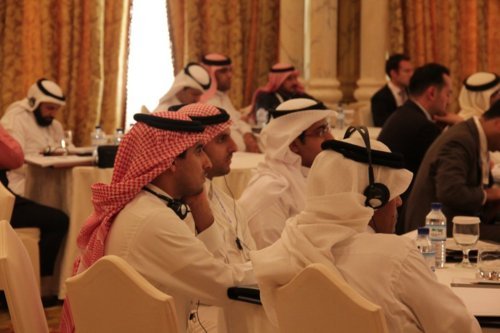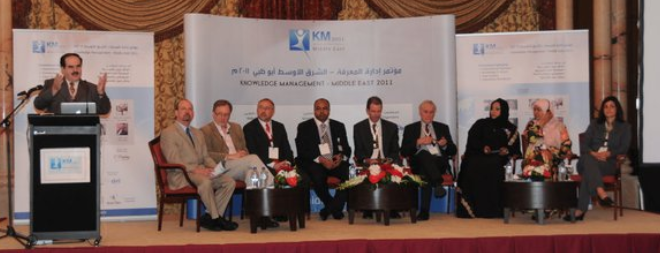That sense of pride was evident among many of the delegates I spoke to. It was borne out in the results of the Knowledge Survey conducted by Sparknow in advance of the event wherein the majority of people said they’d contribute for a sense of wider acheivement suggesting that monetary rewards are not motivators for knowledge sharing.
If I’m honest I was surprised by the number of people in the audience who put their hands up when I asked at the start of my address ‘how many of you are in a KM role?’ Over half of an audience of 120 plus drawn from across the region said they were.

The event was a delightful mixture of formal and informal in a way the the Arab world excels at. Held in the splendour of the Intercontinental Hotel Abu Dhabi it brought together a mix of KM practitioners and wannabees. The organisors will be posting speeches, videos and photos here; these are my observations on the people and customs and what might or might not work in KM.
There is great respect for the views and opinions of others and people are listened to attentively; delegates were happy to contribute personal experiences for this is very much an oral culture. And we were reminded by one of the presenters that
the Koran pushes us for more knowledge
which would suggest KM is pushing against a door that is at least adjar.
The event was a reminder to me of how there is no one size fits all for a KM initative (KM ‘Project’ was fiercely debated and dismissed by the delegates). It was vividly illustrated a day later in a conversation I had in the offices of a government agency when it emerged that it is not uncommon for an employee to be called half a dozen times a day by his or her boss. Contrast that to Western cultures where interactions usually take place via email or instant messaging. And the option of spending a day working at home to focus uninterrupted on a challenging issue is not one that seems to have permeated practices in the Gulf.
These were my takeaways for those running KM initiatives in the region:
- An organisation’s culture is the sum of the culture of its individuals
- Introducing financial incentives for sharing is counterproductive
- The process of transferring knowledge between expatriate workers who still make up a large part of the workforce and nationall staff works best when additional time is built in at the end of a contract for that process to occur
- More information does not make for better decisions; a case of paralysis by analysis?
- Pictures stimulate conversation and brevity in written communication is preferred
- Formal peer to peer dialogue usually requires approval of superiors which means informal ‘water cooler’ coversations often yield most benefit
- Stories amplify KM and are readily understood as a way of exchanging lessons.
Here are some of the distinquished speakers (John Girard, David Gurteen, Dr Allam Ahmed, Luke Naismith, Zabeda Abdul Hamid plus yours truly)

